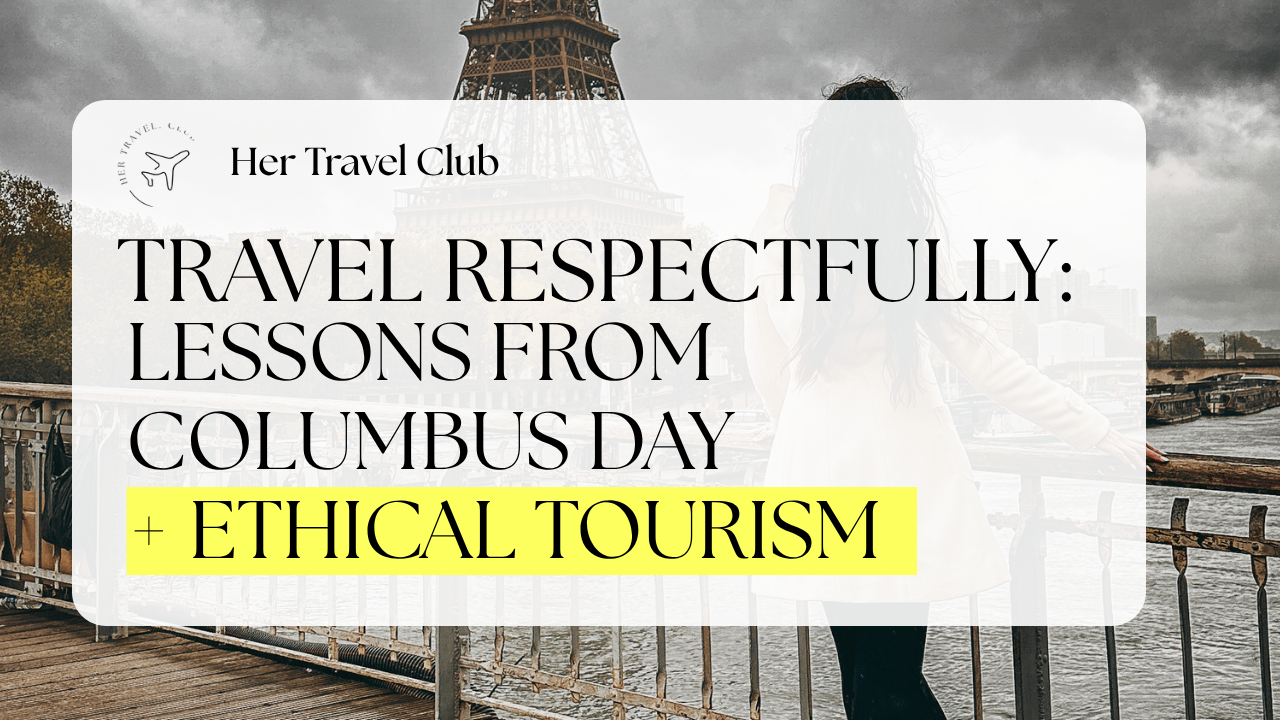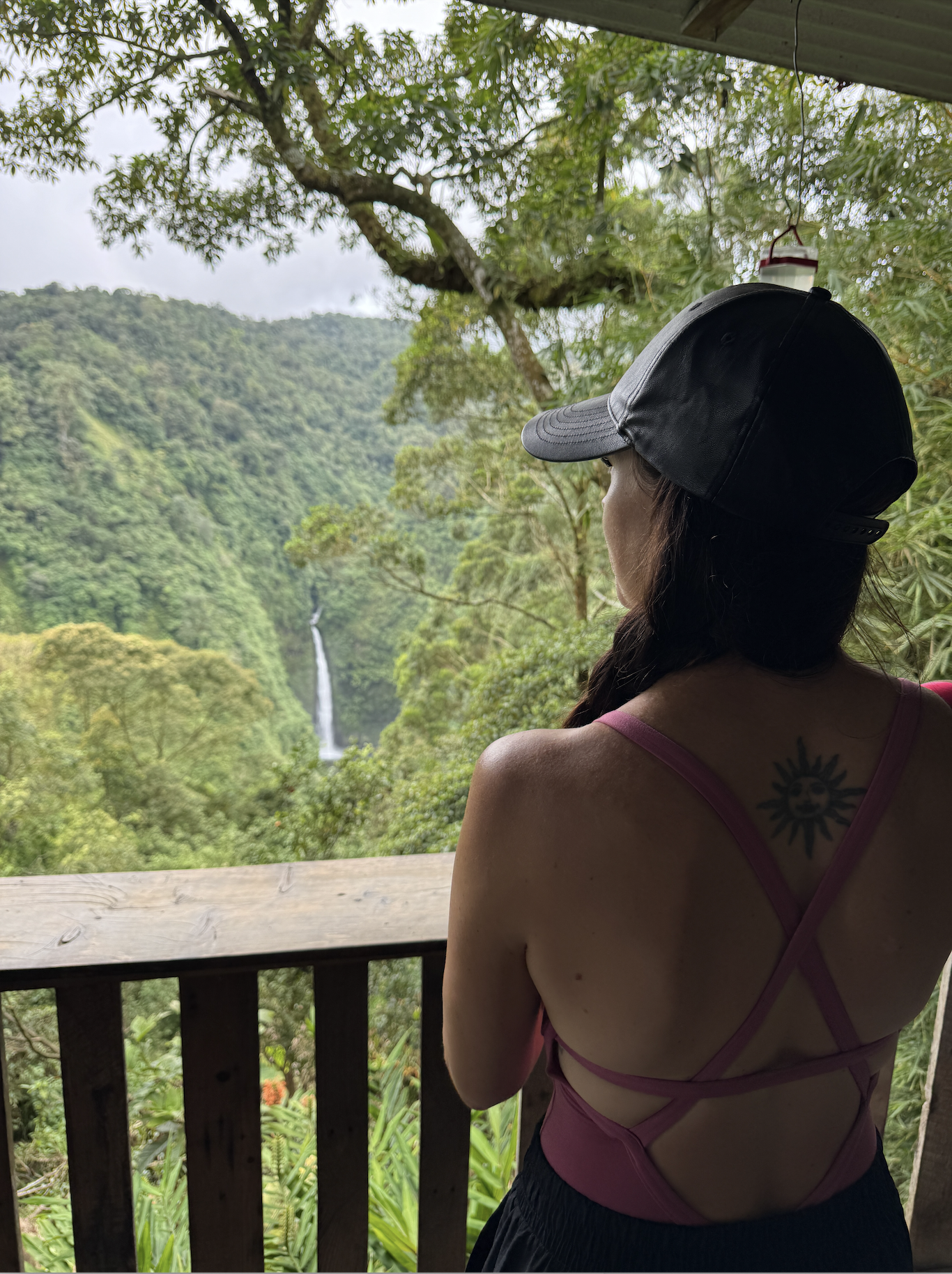Rethinking Columbus Day: What It Teaches Us About Ethical Travel and Connection

I have a hard time celebrating Columbus Day. Every year it comes around, I can’t help but pause and reflect — not just on what this day represents historically, but what it reveals about how we, as travelers, move through the world today.
Because at its core, Columbus Day isn’t just about one man. It’s about what happens when we step into a new land — and choose to dominate rather than understand, to take rather than listen.
Travel has always had the power to transform both the traveler and the place being visited. But it can also harm, exploit, and erase if we approach it with entitlement instead of empathy.
The Origins of Columbus Day — and What’s Missing
The story we were taught growing up painted Christopher Columbus as a brave explorer who “discovered” America. But that version of history leaves out a staggering truth: the Americas were already home to millions of Indigenous people with complex societies, thriving economies, and rich spiritual traditions.
When Columbus landed in the Caribbean in 1492, the Taíno people greeted him with generosity and openness. In return, he enslaved them, demanded tribute in gold, and unleashed a reign of terror that historians like Bartolomé de las Casas later described in heartbreaking detail. Those who couldn’t meet impossible gold quotas had their hands cut off. Many were killed outright; others died from exhaustion, hunger, and disease.
Columbus’s arrival marked the beginning of centuries of colonization, enslavement, and genocide — all justified under the Doctrine of Discovery, a decree by the Catholic Church that gave Christian explorers “divine permission” to seize any non-Christian land and subjugate its people.
To celebrate this day as a holiday of “discovery” is to overlook that it was, for others, the beginning of devastation.
A Lesson in How We Show Up
It’s uncomfortable to sit with this truth. But it’s also necessary.
Because Columbus didn’t just represent one man’s ambition — he embodied a mindset that still echoes today: the belief that the world exists for our consumption. The idea that we can enter a place, take what we want, and leave when we’re done.
When I think about Columbus Day now, I think about how easily that same energy seeps into modern travel — when we expect to be catered to, when we bargain too hard with locals, when we overlook how our presence impacts housing costs, ecosystems, or sacred lands.
Every flight, every booking, every meal abroad carries the question: How are we showing up in this culture?
Are we entering like guests — curious, humble, and open — or like conquerors demanding comfort and control?

A Personal Reflection from Costa Rica
On a recent trip to Costa Rica (which I’ll share more about soon — including how we used reward points to fly there for nearly free), I found myself reflecting on all of this in a very real way.
We spent part of our trip at the Marriott in Guanacaste and the Hyatt in Escazú, both paid for with credit card reward points. The rooms were immaculate, the staff kind, the service impeccable — everything that points travel promises.
And yet, I couldn’t shake the feeling that something was missing.
These resorts, as beautiful as they were, felt slightly disconnected from the pulse of the country. They were worlds unto themselves — polished, comfortable, and isolated from the texture of daily life just outside their gates. I realized that sometimes, even “free” can come at a cost.
The contrast hit me when we spent a few nights at a VRBO treehouse overlooking Lake Arenal, nestled in the jungle near a massive volcano. The hosts greeted us with a basket of locally grown fruit, ran a small restaurant on-site, and took time to truly connect. When we mentioned we were from Utah, our host Kelly smiled, pointed to a distant home along the mountainside, and said, “That couple there — they moved here from Utah too.”
He shared local secrets: hidden waterfalls untouched by tourism, scenic backroads that Google Maps didn’t know existed, and a breakfast spot where the owner covers her patio with hummingbird feeders so guests can sip coffee while dozens of colorful birds dart around tropical fruit.
We ordered something homemade that we couldn’t pronounce, laughed our way through the language barrier, and ate one of the most delicious meals of our lives.
It was then I realized: this is what travel is supposed to feel like.
Why I’m Changing How I Use Points
That trip shifted how I think about reward travel. I’m grateful for what I’ve learned — and I’ll always teach women how to maximize points strategically — but I’ve also come to see that redeeming them for hotels can sometimes insulate us from authentic experiences.
While using points for luxury resorts can absolutely make travel more affordable, it can also create a barrier between us and the very culture we came to experience.
Moving forward, my plan is to continue using points for flights, but focus on staying locally — in VRBOs, boutique guesthouses, and family-run lodges that keep money in the community. And because I’m a certified travel advisor, I can even earn commissions when booking those stays — not from the traveler’s pocket, but from the platforms themselves. It’s a small way to align financial strategy with ethical travel.
The point is this: knowing how to use points is important, but knowing when not to can make all the difference. You can get my Beginners Guide right HERE if you are interested in getting started!
Choosing Connection Over Conquest
Travel will always be one of the most powerful tools we have for understanding the world — but only if we approach it with humility.
Ethical travel isn’t about perfection; it’s about presence. It’s about remembering that every destination is someone else’s home, and every interaction is a chance to honor that.
When we slow down, listen more than we speak, and connect rather than consume, we become part of the healing — not the harm.
Why Indigenous Peoples’ Day Matters
That’s why I choose to honor Indigenous Peoples’ Day instead of Columbus Day.
It’s not about erasing history — it’s about telling it truthfully. It’s a day to recognize the people whose lands we walk on, whose traditions continue despite centuries of attempted erasure, and whose wisdom still teaches us how to live in balance.
The shift from Columbus Day to Indigenous Peoples’ Day is more than symbolic — it’s an invitation to travel differently. To see the world not as something to conquer, but as something to connect with.
Closing Thoughts
So no, I don’t celebrate Columbus Day.
I reflect on it.
I learn from it.
And I use it as a reminder that how we show up — in history, in community, in travel — matters more than ever.
The way we move through the world can either echo the arrogance of conquest or embody the grace of curiosity and respect.
And while I’ll always teach others how to make travel more accessible through points and strategy, (Like in my article HERE about traveling with your family) I also believe the truest value of travel can’t be measured in cents per point — it’s measured in connection, understanding, and the memories that remind us why we wander in the first place.
At Her Travel Club, I believe in travel that uplifts rather than exploits — journeys that connect us to people, culture, and the planet with curiosity, compassion, and integrity.
Because the way we travel becomes part of the story we leave behind.
This post may contain affiliate links. If you book or purchase through them, I may earn a small commission at no extra cost to you. I only recommend travel tools and experiences I genuinely use and love.
All information provided is for educational purposes only and does not constitute financial, legal, or tax advice. Credit card offers, reward valuations, and transfer bonuses change frequently — always confirm details directly with the financial institution before applying. Her Travel Club is not a bank or financial advisor.
